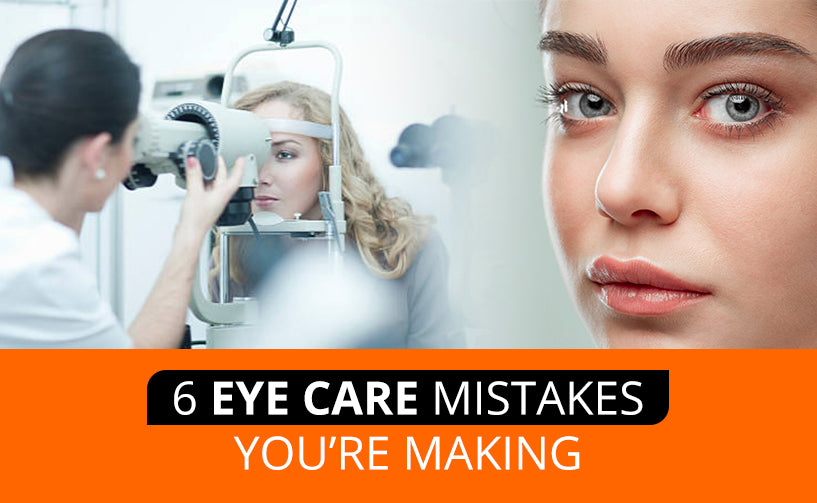Sometimes the most important things in life are often the most overlooked and undervalued, and our eyes have to be one of them. Good eyesight is something most of us take for granted. From the moment we wake up in the morning to the very moment we close them as we settle in for the night, there is not one waking moment that we do not use our eyesight. And yet we are often too busy with our daily lives that we don’t even stop to consider them. It is not until it is already too late or when our vision fails that we only begin to take heed of our approach to our eye health.

Our eyesight is indeed one of the most treasured senses of our body and we don’t appreciate enough how incredible and important they are. They need all the extra rest and protection, just like any other parts of our body. Perhaps it is time we start considering how important they are and start taking better care of them for the years to come. Prevention is always better than cure, and this is very much true when it comes to problems with our eyesight. Therefore, with a little effort, we can easily take better care of this wonderful gift that is the eyes.
Taking care of your eyesight is important. But ensuring you do not make serious mistakes in your efforts is more important. Here are some common eye care mistakes you might be making… and should best be avoided in the future.
1. Touching & Rubbing Your Eyes
While this might seem like a completely common and harmless thing to do, unnecessarily rubbing and touching your eyes constantly can do a great deal of damage to your eyes than you think. An increasing amount of this habit can lead to broken vessels and inflammation in the eyes, especially when done with a lot of pressure. Additionally, another reason to avoid touching or rubbing your eyes is that dirt and germs can get transferred from your hands directly to your eyes which can increase the risk of you catching an infection like the flu or any other transmittable viral diseases. Our eyes are protected by mucous membranes that can easily collect dirt and germs and a great place for bacteria to grow. So make sure your hands are properly clean if you feel the need to touch or rub them.
2. Unprescribed Over-The-Counter Eye Drops
Working in front of a computer all day or staying up late can often lead to itchy or red eyes. Store-bought non-prescribed eye drops may give instant relief to these problems but they can do more harm to your eyes in the long term. It is not advisable to rely on drugstore eye drops as most of them contain preservatives and other chemicals that can make the problems even worse in the long run. Check with an eye specialist if your eyes are constantly red or irritated, instead of buying non-prescribed medications, as they can be more than just an itch or irritation which only the doctors can help you with.
3. Eyeliner On Your Waterline
Applying eyeliner on your waterline can be actually quite risky. The waterline is a thin line of skin just inside the eyelashes that are flushed with tears, which is a natural component of the eye functions. Though it may look attractive, applying eyeliner to this area can result in tiny particles of makeup getting inside the eye, which can further lead to infection. If you are wearing contact lenses, the makeup particles can coat your lenses, depriving your eyes of oxygen. This can also result in soreness or irritation in your eyes. Limiting eyeliner on your waterline or instead, applying it on top of the eyelid or just outside the waterline can be a great way to care for your eyes
4. Sleeping In Contact Lenses
Taking a short nap while wearing contact lenses might be acceptable to some extent but sleeping through the night with your contact lenses on can be dangerous to your eyes. When you sleep in with your lenses on, you are suffocating your corneal areas and depriving your cornea of oxygen which can lead to a formation of bacteria and therefore, lead to a corneal ulcer or even an infection. No matter how tired or busy you are, always make sure to remove your lens before sleeping.
5. Wearing Sunglasses Only In The Summer

Sunglasses not only help you see better on a bright summer day. They also protect your eyes from harmful UV rays that can cause corneal burns, visible spots on the whites of the eyes and even skin cancer on the eyelids. Not only in summer, wearing a good quality pair of sunglasses with high UV blocking even on the cold winter day is crucial to protect your eyes from UV rays. Keeping good quality sunglasses handy all year round is recommended to best protect from the damage done by UV rays.
6. Not Taking Eye Supplements
A healthy diet that boosts the eyes is crucial for maintaining good eye health. Diets that are rich in minerals and vitamins are essential to support healthy eyesight and prevent degenerative eye conditions in the long term. However, a regular diet sometimes fails to provide all these required nutrients making us susceptible to poor vision and compromised eye health. This is why high-quality supplements are a much easier way to get your daily dose of nutrients for your eyes, yet most people are still unaware of or undermining their efficacy and benefits. Taking an eye supplement should not be your last resort but should be taken to boost eye health and prevent or prolong the onset of degenerative eye conditions in the long run.
With the soothing power of Aloe Vera, the therapeutic benefits of Triphala, the healing power of Curcumin, and the nutritious boost of Carrot, Visiongold Juice by Preserva Wellness offers an effective natural blend that safely protects your eyes, preserves your vision and improve eye health. It is the perfect eye supplement that is 100% vegetarian yet amazingly effective.
Our eyes are our most treasured senses of our body and they should be given the required care and attention that they deserve, keeping in mind that prevention is always better than cure, which is particularly the case for our eyes. Take time to consider your eye health and be prepared to take the necessary steps to make changes to ensure your eyes are protected, rested and healthy. Fortunately, these common eye care mistakes can be easily corrected and at the end of the day, it pretty much depends on how much you care for them.






